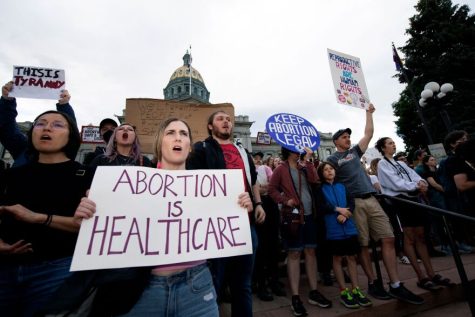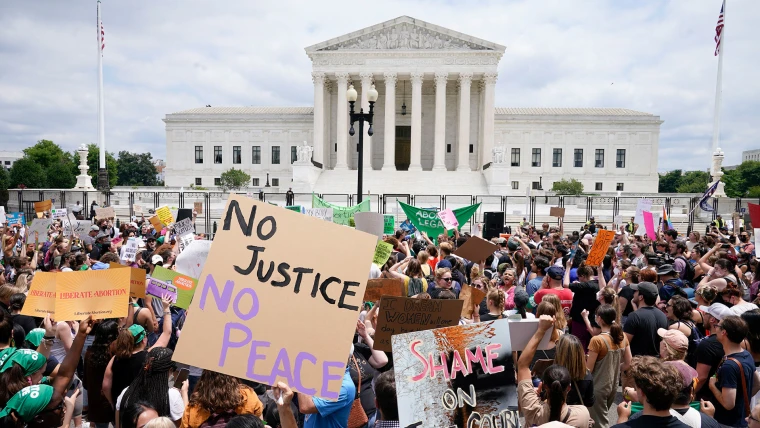Supreme Court takes away the right to choose by overturning Roe v. Wade
Following the overturning of Roe v. Wade protesters gather around the country
To start this discussion there are a couple of things you need to know about me.
I am a woman. I am a sister. I am a daughter. I am a friend. I value human life. And, yet, I still believe in abortion.
Some may say this in itself is a direct contradiction. How can you value human life and at the same time support ending human life? The answer does not have some big scientific or philosophical reasoning. I simply believe in choice.
But let’s back up for a second. Since the term pro-life has come into play, a lot of people have begun to associate pro-choice advocacy with pro-abortion. This is simply not true. While many pro-choice advocates may have had an abortion or believe that they would have an abortion if necessary, many pro-choicers would say that they would never choose to get an abortion. And once again, this is simply a choice. Pro-choice advocates are not synonymous with pro-abortion advocates.
But, on the other hand, what do pro-life advocates truly promote? Are they really just looking to save human lives? Or are they pro-government control? Do they support the death penalty? Do they want to restrict access to birth control? Do they want to limit the rights of members of the LGBTQ+ community? If the answer to any of these questions is yes, then they are most likely pro-government control.
Hypocrisy litters the pro-life movement. Preventing access to abortions, because yes, abortions will still occur just in less safe environments, creates a multitude of other issues to be solved. This means access to birth control needs to increase. This means women should be able to choose whether they have a child vaginally or through a c-section. This means major reform to foster care systems. This means providing adequate sentencing for rapists. In most cases, pro-life advocates do not support these reforms.
This does not mean that the pro-choice movement is without its faults. A lot of women have adopted the position that no man should be able to make laws regarding women’s bodies. And this is true. However, it is necessary to dig deeper. No human being should be able to tell anyone what to do with their body.
Abortion debates often lack discussion about the effects of pregnancy on the human body. Not only is it a nine to ten-month commitment, but it is also emotionally taxing. Postpartum depression plagues many new mothers, some of whom take their own life due to the disorder’s detrimental effects. Add in the possible years upon years of guilt created if a woman chooses to give up her baby for adoption. And, although it may seem shallow, pregnancy does affect physical appearance. There are erasable stretch marks that serve as a constant reminder. There is the pain of childbirth and the possible scarring from a c-section, which is major surgery. Those who give birth often find that their bodies are never the same. In a world full of eating disorders and mental illness, this can be extremely impactful. This does not even take into account the emotional effects on people who need an abortion due to rape or incest.
Yet, this entire discussion still boils down to choice. Every day, human beings make choices. You decide where to go to college. Who to spend your life with. How many children you want to have. By restricting access to abortion one of the biggest decisions someone can ever make is taken out of their hands. By the government. The same government that promises to protect and serve for the good of the people. But how can it be for the good of the people when there is no choice?

And now the Supreme Court has decided to make a choice. A choice that strips the reproductive rights of every female citizen in the United States. Instead of cracking down on gun laws, the Supreme Court has made the choice to take away rights women fought for decades ago. The decision now lies in the hand of state lawmakers. Some may say that this means that abortion is not completely restricted, and that is true. Many states, such as New Jersey, have come out and said that abortion access with continue. However, for the people living in states without access to abortions, the ruling is still problematic. For those who are not financially stable, taking even a day off of work to drive to another state can impact them economically for an extended period of time.
Legally, the overturning of Roe v. Wade puts other women’s rights in jeopardy. The decision to protect the right to abortions was based on the 14th Amendment, which states that all citizens have the right to privacy. The Griswold v. Connecticut further set the precedent for personal privacy when it was established the right to buy and use contraceptives. Now that this right to medical privacy has been stripped, many women fear what will be taken away next. Will it be birth control? Plan B? Same-sex marriage? Women who take this as a serious threat to their future may even seek to be sterilized. But guess what? Most doctors refuse to sterilize young female patients who may or may not have had children because they may regret it later in life. Yet another choice being taken away.
The fact is, even today there is still the underlying thought in most people that every woman wants to be a mother. But motherhood is a choice. Just like getting an abortion is a choice. A choice that is no longer available due to a Supreme Court that votes based on political beliefs rather than constitutionality.



Xuemei Zhang • Feb 1, 2023 at 5:16 pm
You are wrong. Supreme court did not take away rights. It gave the states to choose what they want to do..